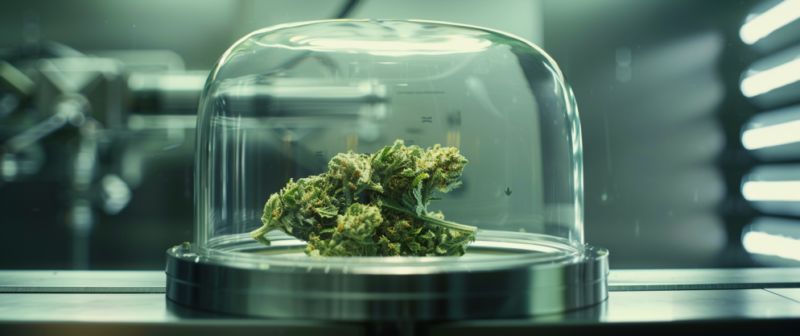What is Delta 8 and Why is it Legal
Are you curious about what is delta 8 and why is it legal?
This article will discuss the legalities surrounding Delta-8, exploring its federal and state legality. Find out why Delta-8 is legal, examining the 2018 Farm Bill, the DEA’s role, and state laws.
Learn about the various uses of Delta-8, from recreational to medical, and the potential risks involved. Stay informed on the psychological, physical, and legal risks associated with Delta-8.
Find the fascinating world of Delta-8 and why it is legal.
What is Delta 8?
Delta-8 tetrahydrocannabinol, commonly known as Delta-8 THC, is a cannabinoid found in the cannabis plant. Unlike its more famous cousin, Delta-9 THC, Delta-8 is often celebrated for its milder psychoactive effects. The legality of Delta-8 has been a subject of confusion. Still, it gained legal status thanks to the Agriculture Improvement Act of 2018, often called the Farm Bill, which redefined the legal boundaries for hemp and its derivatives.
What are the Legalities Surrounding Delta-8?
The legal landscape surrounding Delta-8 THC is complex, involving federal and state laws, regulations from the Controlled Substances Act, and evolving policies influenced by congressional actions.
-
Is Delta-8 Legal Federally?
Delta-8 THC achieved federal legal status through the Agriculture Improvement Act of 2018, but the Drug Enforcement Administration’s regulations have added layers of complexity to its federal legality.
The Agriculture Improvement Act of 2018, commonly known as the Farm Bill, paved the way for the legal cultivation and production of hemp-derived products, including Delta-8 THC. The DEA’s involvement in regulating controlled substances under the Controlled Substances Act has sparked debates over the classification of Delta-8 THC. The ambiguity arises from the distinction between hemp-derived compounds and the scheduling of Delta-8 THC as either a controlled substance or a legal hemp product.
For instance, while the Farm Bill distinguishes hemp (defined as cannabis with less than 0.3% Delta-9 THC) from marijuana, the DEA raises concerns over the conversion process of CBD to Delta-8 THC, potentially categorizing it as a synthetic controlled substance.
-
Is Delta-8 Legal in Every State?
While Delta-8 THC is federally legal, its status varies significantly across different states such as Indiana, Iowa, Ohio, Colorado, and California, each having its own set of laws and regulations.
For instance, Indiana has taken a strict stance on Delta-8 THC, classifying it as a controlled substance. Similarly, Iowa has banned the sale and possession of Delta-8 THC products. In contrast, Ohio does not explicitly address Delta-8 THC in its laws, leading to uncertainty in its legality.
On the other hand, Colorado and California have more lenient regulations, allowing the sale and consumption of Delta-8 THC within certain limits. These state laws can sometimes clash with federal regulations, creating legal conflicts impacting businesses and consumers.
Why is Delta-8 Legal?
Delta-8 THC is legal primarily due to the Agriculture Improvement Act of 2018, which redefined hemp and its derivatives, thereby creating a legal pathway for its sale and consumption under federal law. FDA regulations still play a crucial role in its oversight.
-
The 2018 Farm Bill
The 2018 Farm Bill, also known as the Agriculture Improvement Act of 2018, significantly impacted the legal status of Delta-8 THC by redefining hemp and its chemical compounds under federal policy.
Under this legislation, hemp was differentiated from marijuana based on its THC content – setting a threshold of 0.3% to classify it as hemp. This distinction opened up new avenues for the cultivation, production, and research of hemp-derived products, including CBD and other cannabinoids. The Farm Bill’s redefinition facilitated the growth of the hemp industry and paved the way for the widespread availability of products like CBD oils, edibles, and topicals in the market.
-
The Role of the DEA
The Drug Enforcement Administration (DEA) plays a crucial role in the regulation of Delta-8 THC, primarily through its enforcement of the Controlled Substances Act and related policy measures.
As a federal agency, the DEA classifies controlled substances into different schedules based on their potential for abuse and accepted medical use. Delta-8 THC falls under the purview of the Controlled Substances Act, which categorizes it as a Schedule I substance, meaning it is considered highly addictive and lacks recognized medicinal value.
Under DEA regulations, the manufacturing, distribution, and possession of Delta-8 products are subject to stringent oversight. This has led to varying interpretations of Delta-8’s legality, with some states banning it outright while others allow its sale with restrictions.
-
The Role of State Laws
State laws play a significant role in regulating Delta-8 THC, leading to a patchwork of legal statuses that often require legal interpretation. This can sometimes result in lawsuits and actions by state enforcement agencies like the Indiana State Police.
The variance in state laws regarding Delta-8 THC creates a complex landscape for manufacturers and consumers alike. For instance, some states have explicitly banned Delta-8 THC, while others have imposed strict regulations on its sale and use. This legal ambiguity has led to confusion and disputes within the industry, prompting the intervention of legal experts to navigate the intricacies of these statutes.
In situations where conflicts arise, lawyers often play a crucial role in providing guidance and representation for individuals and businesses involved in the Delta-8 THC market. Instances of enforcement actions, such as those taken by the Indiana State Police, underscore the importance of staying compliant with the evolving legal framework surrounding Delta-8 THC.
What are the Uses of Delta-8?
Delta-8 THC is used for a variety of purposes, ranging from recreational enjoyment to potential therapeutic applications, including the management of discomfort, anxiety, and appetite stimulation.
-
Recreational Use
Recreational use of Delta-8 THC is famous for its milder psychoactive effects, which can alter consciousness without the intensity often associated with Delta-9 THC. Its popularity has surged in states like Colorado and California, fueled by extensive internet advertising.
This rise in popularity can be attributed to the accessibility and versatility of Delta-8 products, available in various forms such as gummies, vape cartridges, and tinctures. Users appreciate the more subtle high Delta-8 offers, making it a preferred choice for those seeking a more manageable experience.
In states like Colorado, known for its progressive stance on cannabis, Delta-8 THC has gained a loyal following among both novice and seasoned consumers. In California, where cannabis culture thrives, the abundance of online ads promoting Delta-8 products has further solidified its status as a mainstream recreational option.
-
Medical Use
Studies have shown that Delta-8 THC interacts with the endocannabinoid system in the body, which plays a crucial role in regulating various physiological functions.
Research is also looking into the impact of Delta-8 THC on neurological conditions like multiple sclerosis, with some studies suggesting that it may help manage symptoms such as muscle spasticity and neuropathic discomfort.
Ongoing research is exploring the potential of Delta-8 THC in providing relief without the psychoactive effects commonly associated with Delta-9 THC, making it a promising avenue for medical applications.
What are the Potential Risks of Delta-8?
While Delta-8 THC offers many potential benefits, it is not without risks, including concerns about substance abuse, possible adverse effects like vomiting, and contamination issues that have led to calls to poison control centers.
-
Psychological Effects
The psychological effects of Delta-8 THC are a mix of potential benefits and drawbacks, including the management of stress and mental health conditions, but also the risk of addiction and other impacts on the brain.
Studies have shown that Delta-8 THC has the potential to alleviate stress symptoms by interacting with the endocannabinoid system in the brain, resulting in a calming effect. This compound may also offer relief for individuals struggling with certain mental health conditions, such as sadness and PTSD.
It is crucial to acknowledge that Delta-8 THC, like other cannabinoids, can lead to addiction due to its psychoactive properties. Excessive and prolonged use may have negative effects on cognitive functions and memory. Research suggests that long-term use of Delta-8 THC could impair brain development, especially in adolescents.
-
Physical Effects
Research indicates that Delta-8 THC interacts with the endocannabinoid system, which plays a crucial role in regulating various bodily functions like discomfort sensation and motor control. This interaction can lead to the potential alleviation of chronic discomfort and tremors for some individuals. Studies have shown promising results in managing neuropathic discomfort and movement disorders with Delta-8 THC.
It is essential to acknowledge that, like any medication, Delta-8 THC isn’t without its side effects. Nausea, vomiting, dizziness, and dry mouth are possible adverse reactions reported. These effects can vary among individuals and dosages.
-
Legal Risks
The legal risks associated with Delta-8 THC are significant, often involving lawsuits and requiring the expertise of lawyers to navigate the complex policy landscape, especially in cases of adverse events.
One primary concern surrounding Delta-8 THC is its legality, which varies from state to state and is subject to ongoing regulatory changes. This uncertainty challenges businesses and consumers alike, as violations can lead to fines, lawsuits, and criminal charges. With the evolving legal landscape, individuals involved in distributing and consuming Delta-8 products must stay informed and compliant with local laws.
Lawyers play a vital role in advising clients on the legal implications of Delta-8 THC, helping them understand the potential risks and liabilities associated with its use. Recent lawsuits involving Delta-8 highlight the importance of legal counsel in addressing product mislabeling, quality control issues, and adverse reactions among consumers.
Final Thoughts – What is Delta 8 and Why is it Legal
Delta-8 THC represents a fascinating intersection of consumer interest and regulatory challenges. Its legality hinges on nuanced interpretations of federal and state laws, influenced heavily by the Agriculture Improvement Act of 2018.
Consumer interest in Delta-8 THC has surged due to its psychoactive properties with milder effects than Delta-9 THC, driving a booming market for products containing this compound. Legal ambiguities surrounding its classification as a hemp-derived substance or a synthetic compound have sparked debates and lawsuits.
The internet’s influence amplifies the spread of misinformation, making accurate information and research crucial to guide public understanding and regulatory decisions. Ongoing scientific studies are essential to determine the safety and efficacy of Delta-8 THC, ensuring consumer protection and compliance with evolving regulations.
Frequently Asked Questions
Will delta-8 get me high?
Yes, delta-8 is a psychoactive compound and can produce a mild high. However, it is reported to have less intense psychoactive effects than delta-9-THC, making it a popular choice for those seeking a more mild experience.
Are there any potential side effects of delta-8?
As with any psychoactive substance, there is a potential for side effects when using delta-8. These may include dry mouth, red eyes, increased heart rate, and changes in mood or perception. It is always important to use caution and start with a low dose when trying a new substance.
Can I fail a drug test from using delta-8?
It is possible to fail a drug test from using delta-8, as some tests may not be able to distinguish between delta-8 and delta-9-THC. If you are subject to drug testing, it is best to avoid delta-8 products or speak with your employer about their policies on using hemp-derived products.


